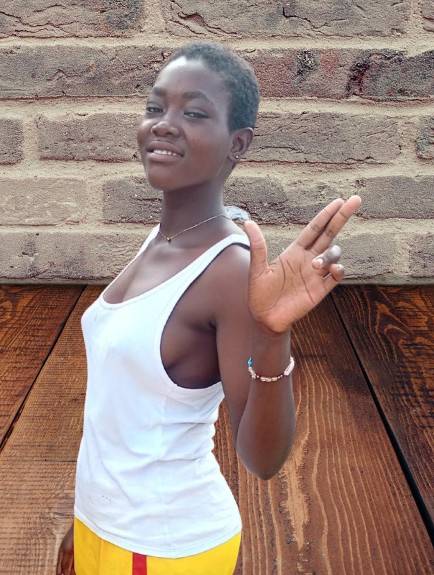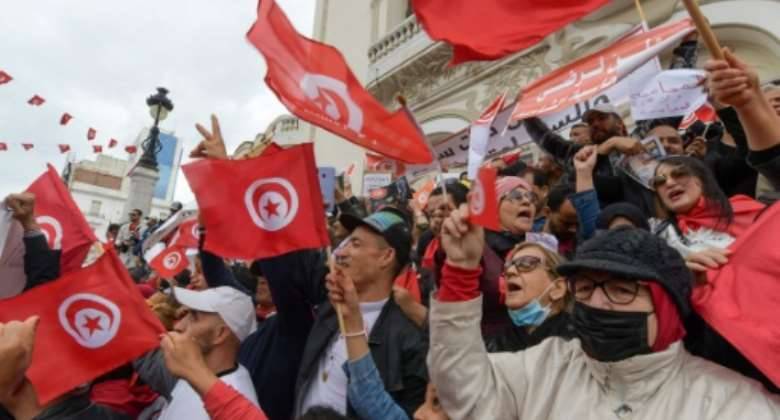Tunisian protesters chant slogans and wave their country's national flag in support of President Kais Saied on May 8. FETHI BELAID (AFP)
Tunisians will vote on Monday on a constitution that would give President Kais Saied near-uncheckable powers, a key moment in his plan to overhaul the political system in the birthplace of the Arab Spring.
The referendum comes a year to the day after Saied dismissed the government and suspended parliament in a decisive blow to the country's often chaotic young democracy.
Its opponents have called for a boycott, but while observers predicted most Tunisians would ignore the poll, few doubt the charter will pass.
"The biggest unknown in this referendum is turnout and whether it will be low or very low," analyst Youssef Cherif said.
Those who vote "will do so either because they like the president or because they hate those who have ruled Tunisia" since the 2011 uprising that toppled autocrat Zine El Abidine Ben Ali, he added.
The text aims to replace the mixed presidential-parliamentary system enshrined in the 2014 constitution, which hailed Tunisia as the only democracy to emerge from the 2011 Arab uprisings.
The leader of Saied's "new republic" would have ultimate executive power and appoint a government without the need for a vote of confidence in parliament.
In a picture provided by the Tunisian presidency on June 20, Sadok Belaid, head of Tunisia's constitutional committee, presents a draft of the new constitution to President Kais Saied. From - (Tunisian Presidency/AFP)
The president would also head the armed forces and appoint judges who would be prohibited from striking.
Saied's rivals, including the Islamist-inspired Ennahdha party, which has dominated Tunisian politics since 2011, accuse him of dragging the country back to autocracy.
The process leading up to the referendum was also widely criticized.
"People don't know what they're voting for and why," Cherif said.
"The web is straining"
Map of Tunisia with the capital Tunis. Author (AFP)
Political scientist Hamadi Redissi said that, unlike in 2014, there was little debate involving all parties involved about the text, which was "hastily written in just a few weeks".
Saied, who has ruled by decree since last year and seized control of the judiciary and the electoral council, held an online public consultation that was supposed to guide a committee — appointed by him — in drafting a new constitution.
But Sadeq Belaid, the legal expert who led the process, distanced himself from Saied's proposal, saying it was "completely different" from what his committee had put forward and warned it could usher in a "dictatorial regime".
Saied released a slightly amended document a little more than two weeks before the vote, but even under the new draft it would be virtually impossible to force the president out of office.
Tunisia is "moving towards a dictatorship, in the Latin sense of the word, where the president dictates everything," Redissi said.
Tunisian security guards stand guard in front of the parliament in Tunis on March 31, 2022. FETHI BELAID (AFP)
The country would not become like China or Egypt, but could eventually resemble Turkey or Russia, he added.
Isabelle Werenfels, a researcher at the German think tank SWP, warned that Tunisia was "moving towards a closed system".
"When you look at the continued dismantling of institutions to monitor freedom, democracy and new rules, it looks like the net is tightening," she said.
Economic woes
Tunisian protesters chant slogans against President Kais Saied and the upcoming constitutional referendum in the capital Tunis on June 19. FETHI BELAID (AFP)
The campaign of those registered for the purpose of public expression of their position on the constitution was tepid.
Only seven organizations or people are registered with the "no" campaign, while 144 were "yes".
In Tunis, billboards with the Tunisian flag - banned under the government's own rules - appeared with a line from an open letter published by Saied calling for a "yes" vote, "so that the state does not falter and the goal of the revolution is achieved".
While recent elections saw low turnout, Saied himself, a former legal scholar seen as incorruptible and ostracized by a widely distrusted political elite, was re-elected in 2019 with a 58 percent turnout.
Today, Tunisians are facing serious economic problems, exacerbated by the coronavirus pandemic and the war in Ukraine, and "very few people are interested in politics," Cherif said.
Saied will urgently need to find solutions to an economy plagued by high inflation, youth unemployment of up to 40 percent and a third of the population facing poverty.
Tunisia's parliament, pictured on March 31, 2022. FETHI BELAID (AFP)
The heavily indebted country is negotiating a rescue package with the International Monetary Fund, but experts have warned that the liberalization reforms the lender is likely to demand in return could spark social unrest.
Meanwhile, concerns are growing about Tunisia's widely praised, if flawed, democracy.
Freedom House and The Economist have already reclassified Tunisia from "free" to "partly free," Cherif noted.
"The fact that people can freely express themselves or go and vote 'no' without going to jail shows that we are not in a traditional dictatorship," he said.
But he added that "this constitution could create an authoritarian regime similar to the regimes that Tunisia experienced before 2011."




No comments yet
Be the first to share your thoughts!